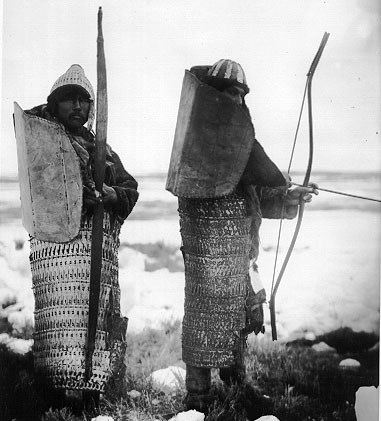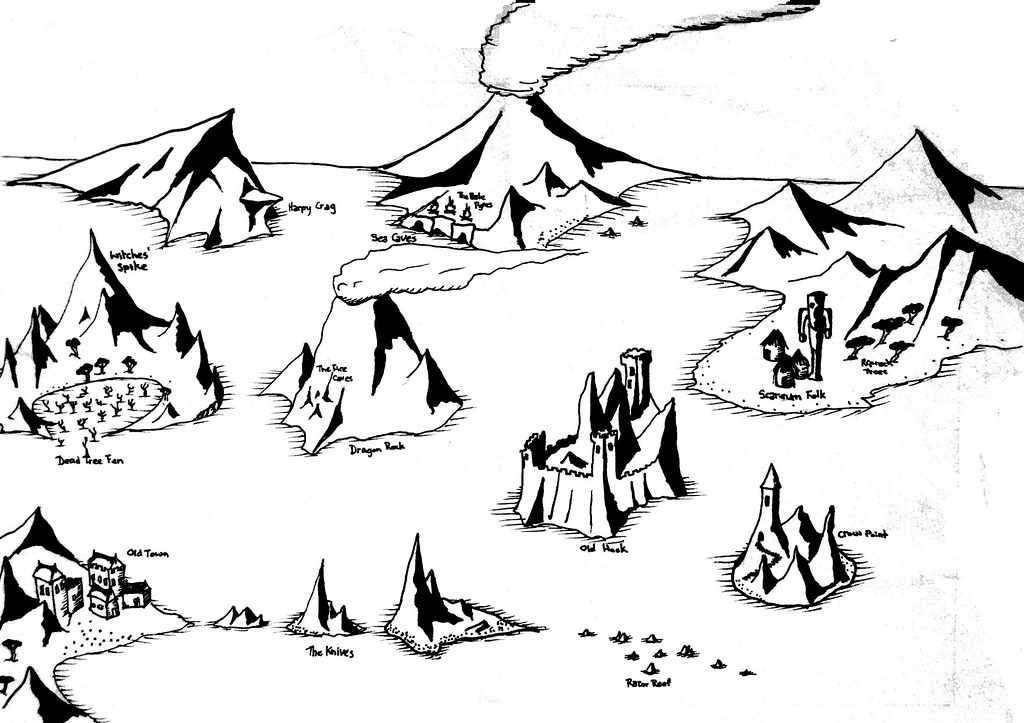I wrote this post for the Forge, in a thread about getting the most out of a First Thoughts thread. There are a lot of new people posting games over there, and one of the recurring things I notice is that they're often not very aware of what's out there in terms of design, often even inside their own paradigm.
Since this took a long time to put together, I thought it could do double-service as a blog post.
Disclaimer: I can hardly claim to be an expert at game design. I've published a couple of things (to very little acclaim), and I've played a heck of a lot, but I don't have the kind of experience or expertise that you'll find from other people on this forum. I have, however, read a LOT of First Thoughts posts, and participated in a number of them. When I say this stuff, it comes from having seen which posts go on to become published games (virtually none of them), and which get recycled back into the designer's pot of ideas. I think that posting in First Thoughts is as much about learning game design as it is about producing a game, and with that in mind, I think reading other games is a great thing you can do to help yourself.
What this list is for:
This is not a manual for how to design an RPG. Don't look at these games as examples of "how to do it right" or "what works". In my view, this list has only one purpose: To challenge assumptions.
I think the number one enemy to good game design is assumption. People come in with an idea of "how an RPG is made" or the "right" way to play an RPG. These assumptions don't add anything to a design, they just cause trouble, and lead to sucky, derivative games. So challenge those assumptions. There are no objectively "good" rules. Reading games that are similar to, or wildly different from your own design will help you realise what possibilities are out there, and what's been done to death.
A noteA common reaction when reading games that challenge your assumptions is to think "that doesn't work" or "I don't like games like that". I really strongly urge you not to give in to those thoughts. How do you know it doesn't work? How do you know you don't like games like that? What don't you like about them? Thinking about the answers to those questions will help you work out what you want in your own design.
First of all, there's a huge list of free games here:
http://www.darkshire.net/jhkim/rpg/freerpgs/It's listed by keywords, so there's good milage in just browsing what looks interesting. Be aware that
any game can be listed here, so there are a lot of games that have never been playtested, or even finished.
"Hippy" games"Hippy" is a jokey name for games that do some really different things with the mechanics of RPGs, often changing, distributing, or removing the GM's authority, or otherwise challenging the "traditional" game structure. These are good games to read if you're considering making a game like this yourself, of if you've never encountered games like this before.
The Shadow of Yesterday
(
http://tsoy.crngames.com/)
This is a full length, complete, and very well-loved game, that contains some very interesting ideas. As "hippy" games go, it's pretty traditional, but you'll especially want to check out "Keys" (
http://tsoy.crngames.com/Crunchy_Bits#Keys) and "Bringing Down the Pain" (
http://tsoy.crngames.com/Resolution#Bringing_Down_the_Pain) as stand-out aspects of the system that mark it as a "hippy" game.
The Pool
(
http://www.randomordercreations.com/thepool.rtf) - Link is to rtf file
The Pool is an interesting game that really breaks down roleplaying to some basic ingredients. It's very focused on the narrative of a game, over simulating an in-game reality. Particularly look at the "monologue of victory" rules, for a mechanic that puts some GM power in the hands of players.
Harlekin-Maus Games
(
http://www.harlekin-maus.com/games.html)
This isn't one game, but a whole lot of games. I don't know why Zak Arnston isn't better known in the gaming scene. He's produced a whole host of interesting, funny, challenging games. Some of these games seem almost designed to challenge assumptions. I'd particularly check out Shadows (
http://www.harlekin-maus.com/games/shadows/shadows.html) and Metal Opera (
http://www.harlekin-maus.com/games/metalopera/metalopera.html) as games that get a lot of play, and have some interesting ideas.
"Generic" games"Generic" is, I think, a total misnomer. The system inevitably puts some slant on the kind of play that you'll get out of it. A game where guns kill you nine times out of ten is going to give you a different feel to one where you can take a number of hits and still keep fighting. A game with half a book worth of detailed combat rules gives a different feel to a game where all conflicts are treated the same. Check out some of the different feels you get from these different games.
GURPS Lite
(
http://www.sjgames.com/gurps/lite/)
I have a confession to make: I've never played GURPS. I made a character once, but that's as far as I got. I've heard a lot about it though. It seems GURPS is the game with a supplement for everything. The rules are extensible, reasonably detailed, and to some people's tastes "realistic". This is a stripped-down, free version of the rules.
Fate
(
http://www.faterpg.com/)
Fate is an increasingly popular, free "generic" system, that you're free to adapt to your own game. My sense is it's got a more freewheeling, action-oriented take than GURPS, and a few mechanics that play with the normal GM/Player divide.
Savage Worlds (Test Drive)
(
http://www.peginc.com/Downloads/SWEX/TD06.pdf) - Link is to pdf file
Savage Worlds is a game I enjoyed for a very long time. It has a bit of a "pulp" flair to it, but it's adaptable to a lot of different genres. It's a very fast and easy system, with some tactical depth and an emphasis on combat. This set of rules is a "test drive" which means you're only getting the very basics of the system, but it's enough to play the game with, and get a feel for the system.
Old GamesI think there are still lessons in design to be learnt from some older games. I think a lot of younger players (and even some older ones) have assumptions about what "old school" play was like, which are pretty misguided. Taking a look at some of these games, you'll see that a lot of the things that are often considered essential aspects of an RPG are actually not present, and that the games promote quite a different style of play to many current games.
Labyrinth Lord
(
http://www.goblinoidgames.com/labyrinthlord.htm)
Labyrinth Lord is a "retro clone" of the Moldvay edition of Dungeons and Dragons, published in 1981. That means that it is almost an exact copy of that set of rules, with some editorial changes, and incorporation of rules from supplements. I've had a lot of fun with this game. Pay attention to how almost everything in the world is instantly lethal to first level PCs. The only way to survive is to take advantage of minute details of the fiction.
Warrior and Wizard
(
http://docs.google.com/Doc?docid=dcsfz7gv_9gzdh7hdz&hl=en)
I actually know very little about this game. It's a clone of "The Fantasy Trip" a game that came out very soon after D&D, and contains some things that, at the time, were completely innovative. It also has some board game aspects, which are interesting given the current trend in D&D.
GORE
(
http://www.yourgamesnow.com/index.php?main_page=product_info&manufacturers_id=71&products_id=1958) - Link is to an online store, but the game is free
GORE is a clone of the percentile-based "Basic Roleplaying" system used in both Call of Cthulhu and Runequest. Honestly, I'm not sure what design lessons there are here, but these are still very influential and popular games, so maybe it's worth a look?
HeartbreakersRon described these games as "truly impressive in terms of the drive, commitment, and personal joy that's evident in both their existence and in their details - yet they are also teeth-grindingly frustrating, in that, like their counterparts from the late 70s, they represent but a single creative step from their source: old-style D&D. And unlike those other games, as such, they were doomed from the start." in his essay, here:
http://www.indie-rpgs.com/articles/9/Heartbreakers get a lot of criticism, but I think there's a lot to learn from them as well. When I read these games, I find myself marveling at the truly interesting and original ideas, while being frustrated with the baggage they carry from the author's influences.
By definition, none of the games linked here are truly heartbreakers, as they're published after the 90's, they're often influenced by different sources, and some of them are very innovative. I'm playing very loose with the concept. These are fantasy games that retain a lot of the trappings of traditional play, but also have some new ideas. A lot of these are genuinely good games as well.
Barbarians of Lemuria
(
http://www.1km1kt.net/rpg/barbarians-of-lemuria)
I've not played this game, so I can't comment too much. Its most recent (and no longer free) version has gotten some good reviews. It's probably an example of some of the better design in this field, a game that has one or two new ideas to offer, in a package that is largely very familiar.
Red Box Hack
(
http://redboxhack.blogspot.com/)
Calling this a heartbreaker is going to get me some mean looks over the internet, so let me explain. It started as an attempt to "fix" D&D (though in a direction different to most heartbreakers), it was driven by the enthusiasm and drive of its creator, and it had some interesting and innovative ideas. It's definitely worth a look.






